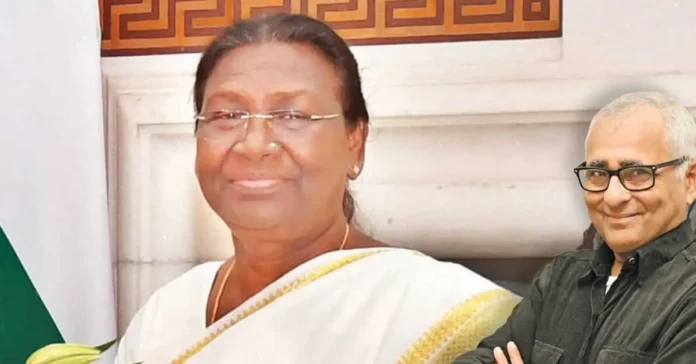By Inderjit Badhwar
The only Indian president I can claim to have known personally was Kocheril Raman Narayanan, the tenth president, holding office from July 25, 1997, to July 25, 2002. He was previously India’s ambassador to America when I worked in Washington D.C. as a journalist and we often dined together at his home in the company of his delightful Burmese-born wife, Usha.
Though relatively small in physical size, Narayanan towered over foreign diplomats and officials in intellectual prowess and debating jousts. I mention him here not because I want to name-drop a prominent personality, but because I bonded with him from almost the moment we first met. This was mostly because I was raised in a small village in UP and he exuded, despite his sophistication, the earthy aura of a country boy when compared with some of the patricians who had preceded him in Washington.
And that was hardly surprising because Narayanan, much my senior, was born in the tiny village of Uzhavoor in Kerala. An official bio-sketch describes his journey from humble beginnings to the highest office in the land as “a symbol of the democratic spirit of India. Elected as vice president in 1992, Narayanan went on to become president in 1997 and became the first Dalit to occupy either position. Narayanan is regarded as an independent and assertive president who set several precedents and enlarged the scope of India’s highest constitutional office”.
But this essay is an introduction to the journey—which is sketched in this special edition of India Legal—of India’s 15th serving president, Droupadi Murmu, to commemorate her second year in office. As India’s first president from a tribal community – she was born in a Santhali tribal family on June 20, 1958 – this former teacher shares much in common with President Narayanan. But apart from my admiration for her remarkable achievements, as spelled out in the pages that follow in this issue of our magazine, I was drawn to her personality for, perhaps, the same reason I had found Narayanan immediately alluring—her village background. She was born and raised in a small village at Uparbeda in Mayurbhanj, Odisha.
And it is my belief that, just as from the mouths of babes wisdom is said to flow, some of the most insightful advice and common sense on civic affairs and compassionate co-existence and governance come from minds nurtured in village life.
I first met Droupadi Murmu in August 2016 when she appeared as chief guest at an India Legal Research Foundation (ILRF) conclave in Ranchi, Jharkhand. She was then the governor of that state. The first thing you notice about her is her poise, grace and gentle demeanour. She has a ready smile and soft voice. There is about her, despite her position, an endearing humility – the hallmark of a person deeply rooted in the wisdom of her village soil and the psychic nourishment it provides. She was dressed in a radiant white sari with a deep blue border.
After the event, the media, both print and online, went to town talking about the first-ever ILRF conclave which mulled over “Access to Justice”. The effort was part of the outreach programme of India Legal magazine to address this vexed question as well as other pertinent legal issues that cry for attention.
A “resounding success”, as the press described it, the meet was attended also by Virender Singh, the Chief Justice of the High Court of Jharkhand; Justice AB Singh; Justice Apresh Singh; Justice Harish Chandra Mishra; Pravin H Parekh, former president of the Supreme Court Bar Association and other luminaries, including bureaucrats, lawyers and law students.
If the success was “resounding” as written in the press, there is little doubt it was partly because of the earthy tone and tenor that Governor Murmu brought to it in her address. Her opening remarks were in flawless English. Then she paused a while and spoke in Hindi. And she spoke with her heart. She reminded the audience that she was first and foremost a villager and that her life’s mission would always remain the upliftment of the poor and rural folk through education and health services and social empowerment.
Then she put her finger on deficiencies in the Indian system of governance that had the audience sitting on the edge of their seats. “I have worked among villagers,” she reminded the audience. “And do you know the three institutions they fear and distrust the most? The thana (police stations), the courts and the hospitals.” There could not be a clearer indication of the president of India, some eight years ago, making public her views that the law and order machinery, the legal system and healthcare delivery were areas in need of serious reform, especially as they impact the poor and disadvantaged.
In this regard, she recounted her days as a member of the legislative assembly when she was a member of a Home Department committee and visited prisons. It was not a happy experience for her. She saw hundreds of incarcerated persons, most of them facing allegations of petty crimes languishing without bail or legal representation, facing “tareeq pe tareeq” {court date after court date}, while those who had committed bigger crimes but had influence and money getting away with legal recourse.
The dispossessed and the deprived, she said, “were those most in need for access to justice” which was the basic foundation of liberty and constitutional governance under Article 21 of the Constitution. She had summed up with a few examples, the theme of the conclave as well as the need for urgent legal reform.
In my own opening introduction on that occasion, I had the occasion to observe that Governor Murmu was not just the First Lady of Jharkhand but would also become the First Lady of India. It was just a chance remark.
I’m glad that wishful thinking bore fruit.


